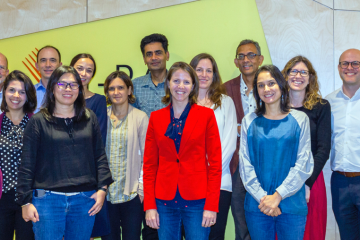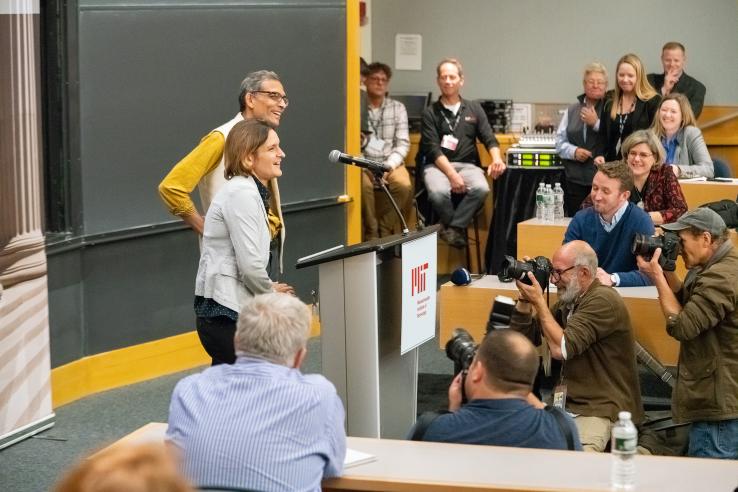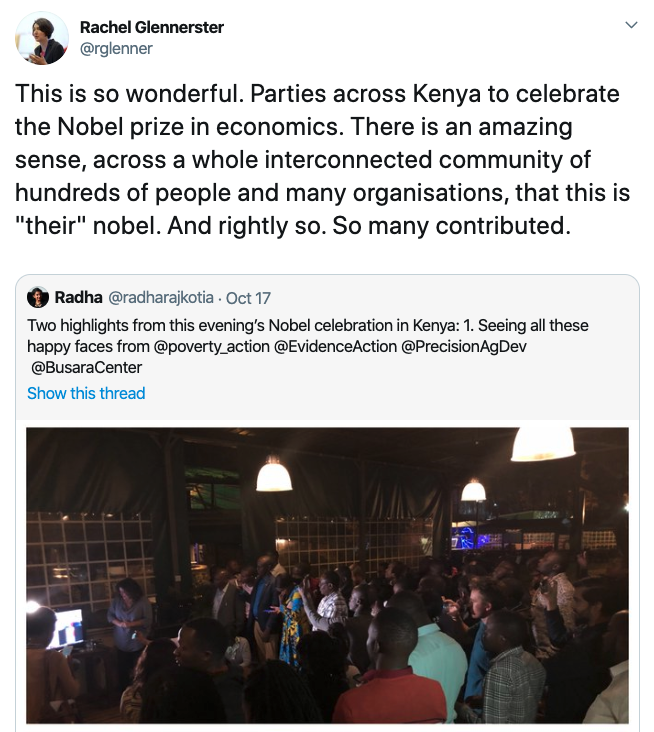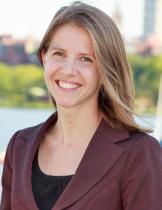
This is your moment

I was in the mountains of Montana with a patchy connection when the 2019 Economics Nobel Prize was announced. As the news spread across time zones, my phone’s notifications kept buzzing. While I wasn’t at home with my J-PAL colleagues to toast the new laureates, I was incredibly inspired by the spirit of community and celebration resonating across the globe on their behalf.
Abhijit Banerjee, Esther Duflo, and Michael Kremer have an incredible number of accomplishments between the three of them, and I count this community that they’ve built to be among the most impressive. This prize has doubled as a well-deserved celebration of a coalition of NGO staff, research assistants, policymakers and partners worldwide.
The scope of this global community was reflected immediately. One of the most heart-warming parts of learning that Abhijit, Esther, and Michael received the 2019 Nobel Prize in Economics was seeing Twitter flood with personal anecdotes of the kindness of all three. My phone’s notifications filled with pictures of people on nearly every continent raising a glass in celebration of “their” Nobel.
The morning of the announcement, the first words Abhijit said at the press conference were, “It’s wonderful to get this prize, but it’s particularly wonderful, I think, because it’s a prize not for us, but also for the entire movement.” My favorite images illustrating the breadth of this movement are from a party in Western Kenya, where a room full of elated attendees are huddled around a computer screen to connect with Michael and Esther over Skype.

Rachel Glennerster, former J-PAL Executive Director, celebrates the Nobel prize announcement over Twitter.
The image above depicts the region of Kenya where Michael first pioneered the experimental approach to development economics for which the prize was awarded. Dozens of people across long-time partner organizations, local staff of IPA, J-PAL and other organizations, alumni of all these groups, and others all came together for an impromptu celebration of the prize.
Seeing these global festivities reminded me why I joined J-PAL in the first place. When I met Abhijit, Esther, and Michael ten years ago I was immediately struck by their humility and determination to share the spotlight. In the years since, these tendencies have permeated everything about how J-PAL is structured and how we do our work. The three of them made a deliberate choice as their influence grew to make their endeavor one that lifted up the work of countless others along the way, and this prize is a recognition of that choice.
These celebrations also highlight something unique about randomized evaluations: They can’t be done in isolation by researchers alone. They rely on dedicated partners who are willing to invest in the learning process at all levels of operation. From the heads of NGOs and government agencies to the individual tutors and case managers implementing programs on the ground, our partners are both essential and extraordinary.
The very goal of randomized evaluations is to understand how a program or policy changes lives in the real world. Without partners who implement these programs on the ground, this work would be impossible. Across the globe, partners serve as the crucial link from research to impact. Our partners provide a deep understanding of the needs of their communities and the questions that must be asked. Because of this, our partners are vital voices in shaping our research agendas and ensuring that the work we do is relevant and valuable.
In the J-PAL North America regional office, we’ve received messages from our state and local partners from over the years offering congratulations on the Nobel prize while remarking on how they feel as though they’re a part of the celebrations.
These messages speak to why we launched the North America office in 2013. Abhijit, Esther, and Michael’s vision is truly a global one. This methodology, approach to partnerships, and dedication to actionable results has the enormous potential to impact lives and reduce poverty everywhere. To us, this meant asking these questions, forming these relationships, and applying these tactics in countries like the United States. We’ve found that the approach has resonated here in the same way it has in other parts of the world for over 15 years.
There is a tremendous demand for evidence-based solutions in North America, and the movement around evidence continues to grow. Just this month, we’ve announced nine new partners through our State and Local Innovation and Work of the Future Initiatives. Over time, we’ll work with these remarkable agencies and organizations to design evaluations of their programs that range from systems to support jobseekers to methods to reduce opioid overprescription.
J-PAL North America is eager to continue to grow our community and engage with new and existing partners on some of the most pressing policy issues of our time, including the changing nature of work, housing stability, and health care quality and accessibility. While these challenges are complex, Abhijit, Esther, and Michael’s Nobel Prize reminds us that if we trust in our communities and in our methods, this work will impact lives for the better.
Thank you to the state and local governments, implementing partners, funders, and researchers who have partnered with us to rigorously study what programs and policies meaningfully reduce poverty in North America. Our work would not be possible without the collaboration and support from each of you. As Esther wrote in an email to all J-PAL staff the morning of the announcement, “This is your moment.”


